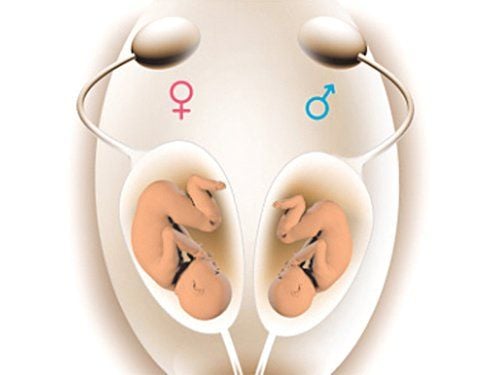The article is professionally consulted by Lý Thị Thanh Nhã Msc, MD - Department of Obstetrics and Gynecology - Vinmec International General Hospital Da Nang.
When you are pregnant, you may receive a lot of unsolicited opinions about your body and the baby. One of the most popular topics to discuss is whether the baby you are carrying is a boy or a girl. There are many older women who tell fairy tales and folk tales about this issue. Below, some information to help you distinguish myth from reality.
1. When is gender determined?
Your sexual activity is established as soon as the sperm meets the egg. It is at the time of conception when the baby receives 23 chromosomes from each parent. Along with gender, eye color, hair color, and even intelligence have been determined.
The baby's genitals begin to develop around the 11th week of pregnancy. However, you can find out the gender through an ultrasound in the following weeks. Of course, that doesn't stop future mothers and their families from making predictions.
Trắc nghiệm: Bạn có hiểu đúng về dấu hiệu mang thai sớm?
Các dấu hiệu mang thai sớm không phải chỉ mỗi trễ kinh mà còn có rất nhiều dấu hiệu khác như xuất huyết âm đạo, ngực căng tức,… Điểm xem bạn biết được bao nhiêu dấu hiệu mang thai sớm thông qua bài trắc nghiệm này nhé!
2. The rumors about signs of having a baby boy
2.1. Morning sickness
You may have heard that the severity of morning sickness is a clue about your baby's sex. For girls, it is thought that the hormone levels are higher. For that reason, you will experience more morning sickness.
The truth is that morning sickness can vary with each pregnancy. A study revealed that women who experience severe morning sickness during pregnancy are more likely to give birth to daughters. On the other hand, there is a lot of scientific evidence to support this idea.
2.2. Skin condition
Some people believe that a girl will steal her mother's beauty. On the other hand, boys give you a lot of acne.
A similar story revolves around hair growth. For a boy, your hair will grow longer and shinier.
2.3. Craving for food
With boys, you crave salty and savory foods like pickles and chips. With girls, it's all about sweets and chocolate.
In fact, no conclusive studies have been conducted on appetite as an accurate predictor of gender. The feelings of hunger are probably more related to your changing nutritional needs.

2.4. Heart rate
One of the most popular rumors about gender revolves around the baby's heartbeat. If the heartbeat per minute is below 140, the baby is said to be a boy. If it’s higher than 140, it's a girl.
Unfortunately, although this sounds more scientific, there is no harsh truth behind it. A study published in Fetal Diagnosis and Therapy shows that there is no significant difference between the heart rates of boys and girls in early pregnancy.
3. How long will you be able to know?
There are a few ways you can find out the gender of the fetus earlier, including the following methods:
DNA cell blood test: Now you can have a blood test as early as 9 weeks in your pregnancy. This can reveal your baby's gender. The free cell DNA tests in the mother's blood contain the baby's DNA. You provide a blood sample, send it to the laboratory, and receive your results in about 7 to 10 days.
But revealing the gender is not the main objective of these tests. The test is used primarily to assess the risk of chromosomal abnormalities in the fetus, such as Down syndrome.

4. Other Genetic Testing
You can take an amniotic fluid sample or a chorionic villus sampling (CVS) during pregnancy. These tests are similar to the free fetal DNA blood test, but they are more invasive. Similar to free fetal DNA tests in maternal blood, they can tell you the sex of the fetus, just not as early.
CVS is usually performed between week 10 and 12. Amniocentesis is performed between week 15 and 18.
If all you want to know is the baby's gender, you might want to skip these tests. They can pose a risk of miscarriage. They are usually only recommended for older women or couples with a family history of genetic disorders.
Ultrasound during pregnancy can determine the baby's gender. This will be done around 18 to 20 weeks. The ultrasound technician will look at your baby's images on the screen and examine the genitalia to identify various signs suggesting whether it's a boy or a girl.
Even if you have an ultrasound, the doctor may not be able to determine the baby's gender due to certain circumstances. If your baby doesn't cooperate and isn’t in an ideal position, you may need to scan again or you might have to wait to find out.
To arrange an appointment, please call HOTLINE or make your reservation directly HERE. You may also download the MyVinmec app to schedule appointments faster and manage your reservations more conveniently.
Article reference source: healthline.com















